#or literally a doc that has nothing on it except one line explaining the concept which is so vague i don't even remember what it's about
Text
tagged by @caffeine-dammit. thanks for tagging me!! 💖💖
Rules: Post the file names of all the files in your wip folder, regardless of how non-descriptive or ridiculous the name. Send me an ask with the title that intrigues you the most and I’ll post a little snippet or tell you something about it! Tag as many people as you have wips!
i'm going to tag: @soysaucemachine @arainywriter @aphrodaisyacs @bittermoonswrites @kkachis @kippielovesyou (only if yall want to!!) (and if i didn't tag you here but you wanna do this plz do!! i would love to hear about your works!!)
> im not tagging as many people as i have wips because i have more wips than people i know. also im putting them under the cut, because it's longer than a list of people i know 😂
diluven.... vigilantes....
sesskagu
buddie 7
buddie 25
awful
east of the sun west of the moon au
bash
:pensive:
:pensive: but worse
love is a bowl of warm soup
jirou momo college/coffee shop
20 y/o hawks + his new sidekick
beep // miruko
amatw au
flames to ice /// rei and enji quirk swap
matsuhana
popcorn
dentist
liek if u cri evry tiem
iwaoi, the one
give your heart a break
caramelldansen
kamui x dabi
mei n toga gorlfriens,,,
pushing daisies
tsuyu + selkie + sirius
death by zero: hei zi & zero
kate has a breakdown
untitled document [suprisingly my only untitled document in my fic folder! all my other untitled docs are either finished writings or non writing things]
shigadabihawks haunted painting au
rip dabi
tododeku 9-1-1
spideytorch
aizawa is woohooing kurogiri.
118 fam bnha
spideytorch strike force
jzjzjjzj tododeku hug
star
in new york you can be a new man [i feel the need to clarify that this fic is not for hamilton, it is not a hamilton au, the musical doesn't even get mentioned in the fic at all. please do not judge 16 year old me's choice of title and music, thanks]
kiyoko
goths
free gifts bitch
#if any of you feel bad about lot of wips or not finishing things then i hope seeing me w this list alleviates that a little jsnsjkzmkzks#this isn't everything in my wip folder bc there were a few things i wasn't sure i should include#those things were either fics that are technically ''wips'' but i don't have plans to ever finish them#or drabbles/warmups that are technically finished and i just never plan to edit or post#or literally a doc that has nothing on it except one line explaining the concept which is so vague i don't even remember what it's about#anything that is just something im not working or right now but isn't abandoned or has more than one line was included though#that means if you ask for a snippet you might end up getting everything i have written so far jzndksjkfksj#there's also two works on here i debated excluding because i'm going to be posting them anonymously when/if i finish them#but im very honest and open and cannot hide things 😇😇😇 hopefully they don't stand out among my 40 other wips 😂#they speak!#tagged#if you happen to send an ask abt any of these i probably won't get back to you til tmr...#im going to spend the next 12 hours grinding on genshin :)
7 notes
·
View notes
Text
Epilogues: Meat ch 18-27 [Epilogue 4]
So that happened.
In this chapter: a struggle over narration itself.
Dirk Strider has assumed control of the narration. Not unprecedented - Homestuck loves to put its narration in-voice for various characters - but in this case he’s making out that it was him all along, which has like, consequences I guess?
chapter 18
Dirk is narrating, and John actually notices sometimes - when Dirk uses words like ‘functional necessity’. But because Dirk has control over his internal monologue, the plot presses on.
It seems that just about the entire Furthest Ring has gone into the black hole, except for John maybe? Dirk narrates that John starts to blame himself for all this, and thereby decides not to go back to Earth C. He then directs John to find his dad’s wallet, floating in the void.
Despite what Dirk has said, he certainly has a different narrative voice to the preceding narration.
It’s notable that John seems to have some independence from Dirk’s narration. He can directly respond in dialogue to Dirk’s declarations, including to challenge them. Dirk’s power as narrator seems to be limited, not equivalent to the full powers of the ‘author’.
chapter 19
Dirk continues to narrate Jade giving an economic presentation to Roxy and Callie, on the subject of how Jane wants to basically recreate capitalist hierarchy, but on the new world, and that’s a pretty dreadful idea. She actually says the words “capitalist hierarchy”, and declares “none of that stuff works”... Homestuck’s politics seem to have changed, at least somewhat. (Perhaps due to Cephied’s influence..?)
Roxy is reluctant to get involved in politics, and concerned for Jane... and Dirk says something which I think will be important.
In the spirit of full disclosure, Roxy’s the only one left I haven’t been able to crack. Her mind remains a total enigma to me, just like it always has. If I had to guess, it’s her Void powers that make her invisible, even to increasingly omniscient parties such as myself. For all intents and purposes, it’s like her thoughts don’t exist. She’s the same person, as far as I can tell. She still wears her heart on her sleeve. But the bottom line remains: Roxy Lalonde is still utterly fucking inscrutable.
Anyway, then something else significant happens... Callie says they’re nonbinary.
CALLIOPE: yoU are absolUtely not an asshole!
CALLIOPE: i didn’t mind being called a girl. i still don’t really mind, it’s jUst not exactly... accUrate.
CALLIOPE: bUt i did take comfort in “being a girl” for a very long time. this is something i’ve only recently decided.
Roxy likewise says they’re enby too... this causes Dirk to have a bit of a meltdown.
I never would have guessed. Not that I’ve spent much time contemplating issues related to gender. I’m pretty secure in my expression of masculinity, and...
You know what? Fuck this. I don’t owe anyone an explanation of any sort on this topic. I’m confident with who I am, what I am, my gender, as well as my understanding of the concept. You want my honest opinion? It’s fucking fantastic. Good for them. Both of them, I mean, but also, both of them in a singular fashion, since each one can now individually be referred to by the conventionally plural word “them.” I’m ecstatic for this personal development they’ve embraced, for the people they are, the lack of gender they identify with, and the pronouns they prefer. I’ve got no problem with it whatsoever, and frankly, it’s fucking insulting anyone would ever imagine otherwise.
So yeah, I’m gonna allow it.
‘secure in his expression of masculinity’ was not the impression I had of Dirk personally, but I guess we’re going with this characterisation here.
For the rest of this chapter, Dirk keeps misgendering Roxy and Callie in narration - seemingly not deliberately, he swears and corrects himself shortly after.
There’s another interesting conversation where Calliope talks about how ideas of gender were, ‘circuitously’, transmitted to Calliope/Caliborn from watching Earth, and how these shaped Alternia (ok this one’s a little confusing because they didn’t make Alternia? though of course Doc Scratch did affect Alternia). So the system of gendered social relations is literally a “copy without an original” - Baudrillard was more right than he knew!
Anyway Dirk interrupts this discussion to narrate that Jade has a sudden vision of the black hole, and passes out...
chapter 20
Jade ‘wakes up’ in the furthest ring - was there a Dream Jade out here? i thought all the dream selves died but I don’t really remember anymore. Over here, she’s injured - she’s got a big piece of ‘the absence of a future’ skewering her.
Dirk narrates how she’s drawn towards the black hole - ‘the dead cherub is making her move’. At one point, his orange narration is interrupted by red text - the word ‘come’.
Of course, we now know that this dead Jade will fall into the Candy universe, where it will be inhabited by alt-Calliope. I am rather confused about how this came about though. Who’s this almost-dead Jade floating in the Furthest Ring? Why did Jade’s consciousness get shunted into her body?
chapter 21
Dave and Karkat are witnessing the first brood from the Mother Grub. Dave figures it’s kind of gross... and Karkat agrees after ribbing Dave a bit for being insensitive.
Anyway they’re here to try and win over Rose and Kanaya to the election campaign, only, they’re being predictably very Dave and Karkat about it, which is fun. Dirk’s narration is almost taking a backseat here... though occasionally stepping in to point to a trait of characterisation as why he’s going to win.
It’s nice to have Kanaya give some proper dialogue! She talks a bit about troll reproduction, the latent potential for fascism in both Jane and... Feferi. Which, fair.
Anyway Kanaya is rightly pissed about Jane’s plans for troll eugenics.
Dirk occasionally editorialises. Morality, he declares, is a cultural construct (complicatedly true so far as it goes) - it’s “pure ego” for them to think their morality will guide them to the “most effective” laws (that’s also a cultural construct you fucking idiot!)
Dave, continuing in his capacity to make everything as maximally awkward as possible, starts speculating about ectobiological ‘Rosemary babies’ (Kanaya has apparently not considered the term ‘Rosemary’ before, and declares that she hates it).
Kanaya gets concerned and calls Rose - and Dirk reminds us that she’s unconscious on his floor, and answers for her, but explains nothing. Because “John’s doing something important to the plot again” - and Dirk has to be there to narrate, I guess.
chapter 22
Keen to complete his full assumption of the role of ‘anime villain’, Dirk’s narration starts talking about breaking down the boundaries between people to become gods - to become ‘one god’.
Anyway, in this chapter, John bumps into Meenah’s ghost. She steals the Ring of Life that he previously took from Aranea while performing his current spate of retcons, and jumps into a ‘server’. (What did the servers do again? I don’t remember... ok apparently they’re just there in the Furthest Ring, as places people can store such things as wizard fiction and ~ATH programs on them...)
anyway it seems that Meenah can go through the door in the server somehow. presumably ending up in the Candy universe? idk. The wiki didn’t say a lot about what these servers do.
chapter 23
Not much narration, just dialogue. Kanaya arguing with Dirk, specifically. She’s not impressed by Dirk’s excuses (Dirk briefly interrupts to declare that she doesn’t really ‘understand’ Rose, even though she loves her) and sets out to retrieve Rose. Dirk keeps this a secret from Rose...
chapter 24
Minimum editorialising from Dirk this time. John floats around endlessly, and runs into... Terezi! Sure am glad to have her back :D
chapter 25
Dirk and Rose have an argument about... intimacy, identity, and other such philosophical things. Kirkegaard is name-dropped, and it comes out that Dirk (like me lol) gets most of his knowledge from Wikipedia, because obviously he grew up in a post-apocalyptic world...
ROSE: Who exactly were the academic cognoscenti of your era to determine which sources were deemed respectable?
DIRK: That would be me, obviously.
ROSE: Ok.
DIRK: I suppose you’re going to tell me you haven’t read enough Wikipedia articles on loads of scholarly shit to fancy yourself an elite academic by 25th century standards as well?
ROSE: No, I guess I have.
ROSE: I’d be one of the top intellectuals by that measure.
ROSE: A measure set by, I guess, literally one solitary self-absorbed teen boy for the express purpose of making himself feel clever.
DIRK: Absolutely correct.
They agree to have an ‘amateur philosophical debate’, which comes around to whether ‘free will’ exists. Oh boy. Dirk gets Rose to try to stand up, but then doesn’t ‘narratively allow’ it.
Dirk lectures her on the origin of her condition: the disappearance of boundaries in the ‘ultimate self’ amounts to an ‘unbundling’ of experiences (subjectivity, I guess) and the physical processes connecting to it. Dirk, supposedly, is strong enough to withstand this - so he offers to support Rose as she opens her ‘other eyes’, seeing what Dirk sees - presumably the ‘entire story’ that they’re in?
In this state, Rose is also able to see across into the Candy story. She describes both branches as a kind of ‘gross conceptual clumping’, comparing it to congealed sugar in a drink.
Dirk invites her to ascend - that she won’t be ‘her’ anymore, but ‘better’. This is described as an intimate process of perfect knowledge of the other person... and leads Dirk to start speaking possessively of Rose, his daughter in every respect, including ‘soul’.
Oh no Rose... this isn’t ideal :/
it’s funny, I have written before about such a ‘coming together’ of people, of ‘ascension’ in a similar sense, in my story ‘hacker’. but that wasn’t about assuming an ‘ultimate’, godlike form - the gestalt was a different person with different concerns, but not a ‘perfect’ person. here it’s a much more negative thing - a way for Dirk to take control over the ‘ultimate’ Rose.
chapter 26
Dirk’s narration seems to be perceptible, at least in some sense of inner monologue, to Jade. He’s trying to persuade her not to descend into the Black Hole (which, we now know to mean, the Candy universe) through his ‘metatexual’ messaging.
But he’s not succeeding. Alt-Calliope once again interrupts the narration at one point - and Dirk previously did not seem to recognise that it’s her doing it, but now he does.
In Dirk’s eyes, what he’s trying to prevent is a suicide. We know that going into the black hole is not suicide, but going to the Candy universe.
Notably when Dirk has the narration outright declare that something happens, that does not mean it takes effect in the way he describes. He is literally an unreliable narrator.
chapter 27
At this point, alt-Calliope and Dirk are outright fighting to contradict each other in the narration. (i’m gonna keep using ‘she’ pronouns for alt-Calliope, since to my understanding she’s a different person than Calliope)
alt-Calliope’s descriptions are adorably alien - referring to the ‘layers of flesh over her skull’ that maker her ‘expressive’, for example.
Apparently it’s not Jade occupying Jade’s body back on Earth C - the Meat!Earth C that is - but alt-Calliope. Alt-Calliope starts lecturing Dirk in the narration of the corrosive effect of his ‘megalomaniacal’ intentions. Somehow, she pretty much entirely shunts Dirk out of the narrator role. Dirk’s text - complaining rather than narrating - shrinks, and ultimately disappears.
There’s a fucking amazing moment when alt-Calliope gets Dirk going on a whole rant about katanas and how she’s supposedly metaphorically using them wrong.
But ultimately, what she’s going to do is just... ignore him. Or rather, talk about him like he isn’t in the room; use his metaphors, but do not allow him the dignity of response.
experiences such as the sensation of presiding over a vast, empty ocean. his ocean, which terminates with his horizon. it is a barrier, not real, but psychological, symbolic. no matter how much power he achieves as a man, he knows there are horizons he perceived as a boy which he may never cross. and yet i have crossed mine, with the express purpose of perpetually and eternally reminding him of his limits, and of enforcing them. limits, which like his vast, empty ocean, serve to remind him that he is phenomenologically, if not literally, alone. that he has experienced loneliness intimately and absolutely, just like i have. but unlike me, he is terrified by it. and i, unlike him, understand all too well that the children left alone are those who most despair at being ignored.
Epilogue 4, in summary
Damn. I can see why they call this the ‘meat’ route.
So.
Dirk has found some way to assert control of the narrative voice. In this capacity, he’s run roughshod over the various events trying to mechanically arrange them to achieve... some kind of end. But his carelessness in attending to the specific characterisations, instead of relating everything back to himself, somehow left him vulnerable to be excluded from the narration by alt-Calliope.
Whatever Dirk’s plan is, it seems to require... Jane and him to assume rulership of Earth C, and... what else? Well he wanted Jade to go into the Furthest Ring, but not to enter the black hole (because ultimately that allowed alt-Calliope to enter the narrative). He wanted John to do various ‘plot relevant’ things, like... presumably hand over the ring to Meenah, acquire the wallet, and meet Terezi.
Where’s all this going? Fuck knows lol!
We can try and talk about all the issues of identity, ‘free will’ and so forth towards the end, and the interesting attempt to connect that to gendered subjectivity, once we’ve taken in the story as a whole.
2 notes
·
View notes
Note
I don't want to sound too, ah, plebian, but can you explain the meta-plot of Multiversity? The Just, SoS, etc, were all very fun, but the Ultraa Comics stuff went over my head.
Not at all! Multiversity was weird as hell,and in terms of getting what the point of it all was, it doesn’t help that mostof the one-shots only tie in thematically (aside from the basic idea that TheGentry are corrupting these worlds) rather than how in Seven Soldiers everythingcomes back plotwise for the finale. There’s breadcrumbs - a piece of Monitormythology here, a suggestion that comics reflect other events in the multiversethere - but by and large, the one-shots serve to lend context and emotionalweight rather than directly inform the larger plot with Uotan, Superman and therest of the heroes.
Iwrote about Multiversity before, always with the intent ofdoing a follow-up piece going more into the individual issues, so here’s mefinally getting around to that now that it’s been, oh my god, two years sincethe series wrapped; you’ll probably want to read that article first, since mywhole “Multiversity is about time” thesis from that is the centerof pretty much everything I’m going to talk about here, especially at the end.I’d also recommend David Uzumeri’sannotations for Comics Alliance of all the chapters up through Mastermen,and @charlotteofoz‘s excellent piece on UltraComics, as well as the piles upon piles of other great writing aboutthis book out there.
Continued below; this is a long one, obviously with plentyof spoilers.
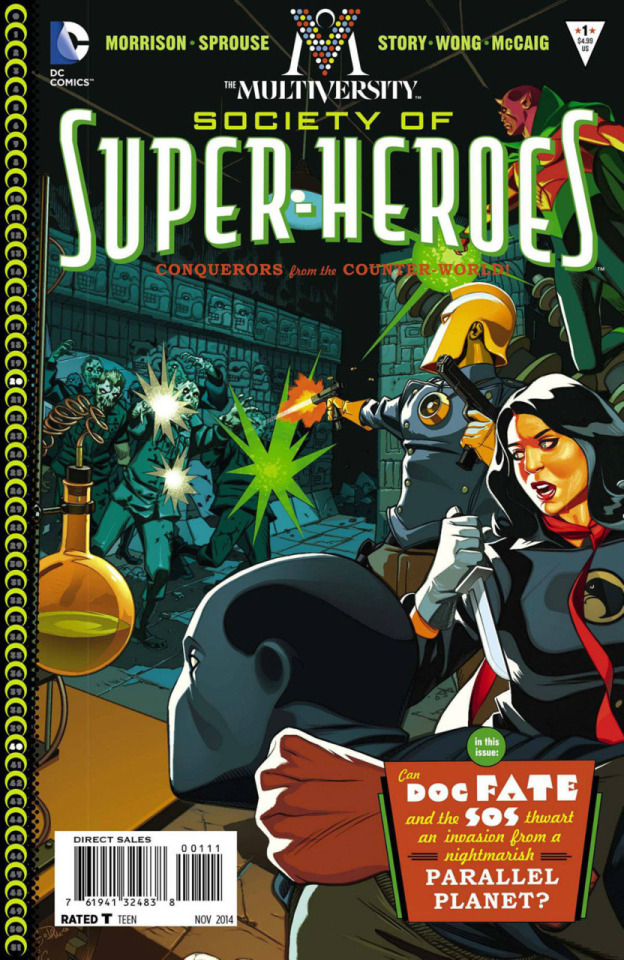
Since Multiversity #1 is one half of alarger story that’s bookended later (it’s not even the first chronologically,since a couple characters from The Just are already at theHouse of Heroes), let’s start with SOS. More than each issue as anartifact unto itself - this thing would be even longer if I went into that, andthe annotations I linked to I think already do a more than satisfactory job inthat regard - I want to talk about these in terms of how they inform the whole,and Society of Super-Heroes sets down the template in twomajor ways in that regard:
1. Each of these stories correspond to a given decade of thehistory of the superhero - in this case, in spite of the 1920′s trappings, thatthey’re going through the parallel universe equivalent of World War II and thepresence of a number of Golden Age figures suggests this is meant to be read asrepresenting the pulpy heroes of the 1940s.
2. Each of the chapters of Multiversity correspondto a classic story published by DC Comics, but grotesquely inverted (similarly to how each arc of his Batman and Robin mirrored a classic Batman story, ending with Batman and Robin Must Die! inverting his own Batman R.I.P.); here, thefirst standalone installment of this latest multiversal threat is naturallymodeled after the original “Crisis on Earth-One!/Crisis on Earth-Two!”JLA/JSA crossover, except this time when the two parallel Earths make firstcontact (through the same crystal ball as in that original story no less), itleads to war.
And much more than a simple categorization like theabove, SOS introduces the major shared conceit of theone-shots: the degeneration of the superhero as a concept through theintroduction of time to the proceedings. In this case through wartime, as thepromise of the birth of the superhero at the beginning of the story is undoneby 5 years of hell, grinding our leads’ ethics down to the level ofkill-or-be-killed, with Doc Fate remorselessly torturing a man for information(in what I have to read as a reference to Doc Savage’s “Crime College”),Immortal Man reverting to his most primal roots, and Atom literally beating anopponent to death. It’s the most straightforward “well, in the real worldsuperheroes couldn’t be that moral” deconstruction possible, but framed as theconsequence of conditions the superhero wasn’t built to deal with rather thanan inherent failing. In that regard, while I don’t think Multiversity wastypically much influenced by the then-present goings-on at DC in the comics orelsewhere - Morrison’s said more than once that most of the issues werescripted years before the art was done, minus some tweaks here and there - it’shard not to read this issue as at least something of a reaction to the New 52and particularly Man of Steel, especially with lines like “Doc.I just killed a man. I–I brought you some time, but myprinciples–I–I killed a man.” And that fall is the direct, literalvictory of the villains of the story.

For The Just, while it owes a debt to All-StarSuperman since itwas originally planned as a spinoff of that book - an acknowledgeddebt given the appearance of Klyzyzk Klzntplkz’s Hyperpoon, even though thecircumstances of Superman’s death in here preclude this being set in that world- in spirit it’s a broken mirror to Kingdom Come and theglitzy, too-cool, airbrushed ‘90s milieu it inhabited, hence the legacy heroesand Ben Oliver’s photoreal style being notably similar to Alex Ross’s here.It’s Kingdom Come’s party scene, except for 40 pages, andSuperman never comes in to whip them all into shape. They just keep drinkingand dancing as the world burns.
In truth though, this isn’t really a comic about legacycharacters; they’re a shorthand for time having passed and the superheroicidentities having degraded over time, but it’s no coincidence that this is theonly issue to actually have characters going by Superman and Batman as theunambiguous leads (or that Superman’s a useless dope, while Batman’s the onlycompetent one but also infinitely more ridiculous and transparent than hethinks), because it’s about the DCU specifically as a decades-long construct atthis moment in history. If most of the other issues are about time damaging thesuperhero through inevitable contact with real-world morality, this shows thepainful endgame of spinning their wheels without end: they become heartlesscopies of copies of themselves, all their battles knowing pantomime, muggingfor the cameras even as there’s nothing left for them to do that anyone caresabout, least of all themselves as they question why anyone even buys comicsanymore. The Just is the CW’s DC Universe twenty years fromnow, where most of the audience has left and the budget has been slashed tonothing but just enough viewers are sticking around that they have to continueit somehow, so it devolves into old-fashioned CW soap opera bullshit, becausehow that’d apply to these characters is all they have left in their arsenal:Superman’s angry that Batman’s fucking Lex Luthor, but will they ever admitthey just want to fuck each other instead, readers? Tune innext month to find how out we’ll delay giving the answer!
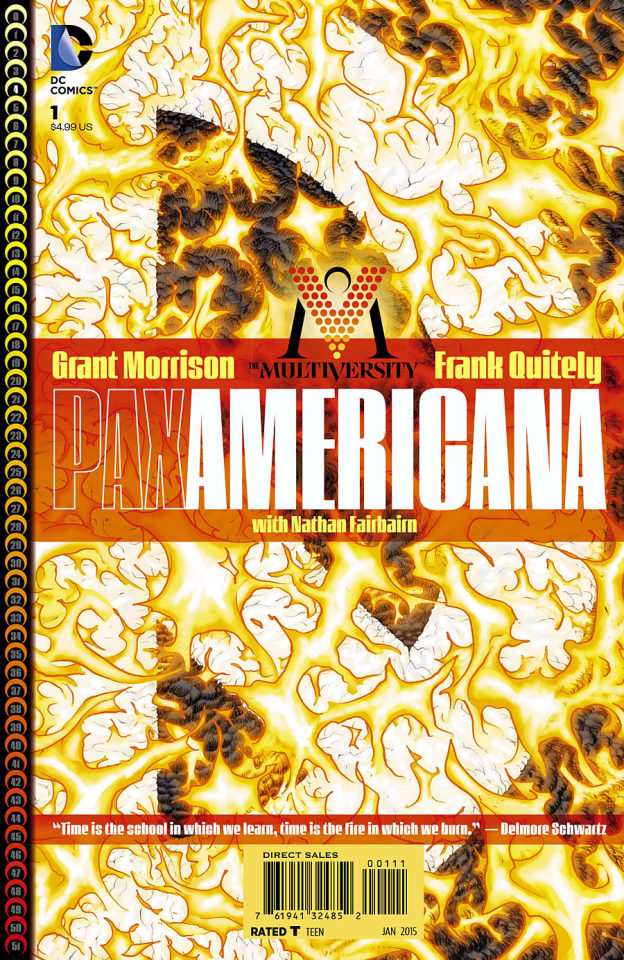
Then we hop over to 1980s political horror and theinevitable shadow of Watchmen, in…maybe the best, or at leastmost remarkably-constructed single issue of a superhero comic of thedecade? Pax Americana certainly felt like it when it came out.In any case, our main concern here is another consequence of time as applied tosuperheroes: the desire, as embodied by President Harley, to force them to makesense in the real world in tune with an ‘adult’ perspective. In an attempt torectify his guilt for accidentally killing his father, the first superhero andthe only morally pure one - his entry to the murky world of adulthood, assignified by the second-to-last line “Remember? That was when it allmade sense, right?” - he wants to reconfigure superheroes into virtuous,regimented tools of the government, with himself as the greatest hero of all asa resurrected American Christ to lead the world into a new golden age.
It fails horrifically of course, because his worldview - theworldview shared by Captain Adam, and Doctor Manhattan, and Watchmen itself- is by Morrison’s perspective inherently flawed, incapable as it is ofperceiving the repercussions and chaos of truly ‘real’ humans. Take notewhen Harley’s consciousness expands that at first it fragments into personal,evocative, visceral imagery, but when that expanding holistic view of theuniverse is inevitably too much to hold all at once, it simplifies back downinto simpler symbols, shapes and geometric solids, much in line with howMorrison spoke of Watchmen’s structure in Supergods asconfining and inflexible. Where Ozymandias’s plan to save the world went offwithout a hitch - at least until it lead to him putting on a robe andkidnapping Tim Drake, as continued this November at a comic book store near youin Doomsday Clock* - Harley’s fails catastrophically, because inthe ‘real’ world superheroes wouldn’t obey genre and narrative conventionsto the extent the likes of Nite Owl and Rorschach still do, living as they doin a world that still has flying Owl-cars and villainous master plans; anyonewho put on a mask to fight crime would be violent, callous assholes of thedistinctly uncharismatic variety whose grand schemes fall apart, whoseinvestigations never reach resolution, and who end up inevitably co-opted andrendered obsolete. In the end, as we saw with Peacemaker defending Bush toHarley’s barely-restrained glee, and the V.P. lecturing about selling childhooddreams back to adults, underneath all his mature aspirations Harley just wantedto find a way to force the world to let him love something the way he did whenhe was a boy…but as Adam reminds us, when you take it all apart to thatextent, there’s not really much left, and even if you put it all back togetherit can never be the same.
* I maintain it’s a very real possibility that PaxAmericana, meant to close the book on Watchmen once andfor all, was a part of what led to its revival; that someone in DC caught windof it during production and figured “oh man, Watchmen’s aboutto get some play again, now’s the time to do something with it.”
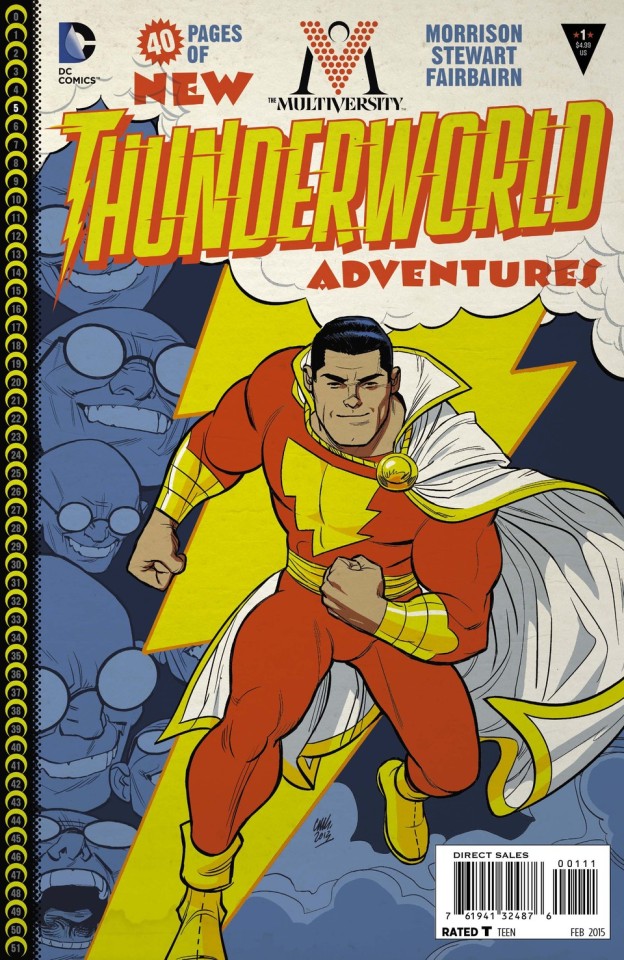
That brings us to Thunderworld Adventures’ 1950scolor TV world of retro adventure, the logical retort to the rest of Multiversity andthe one it needed to be complete: if time destroys superheroes, why not justturn back the clock and make it like it was when you were a kid? But unlike itscounterpart comic All-Star Superman (Morrison mentionedrepeatedly in interviews that this was him giving Captain Marvel the All-Star approach,and the structure - of Marvel facing off against counterparts of himself in theface of his inevitable doom, with his scientist arch-enemy finding a way togive himself his powers - is more than a little familiar), this isn’t anattempt to recapture the best of those elements in a modern context, but a purenostalgia exercise.
Yes, that means a happy ending, and clever fun, and a nicemoral about the self-destructive nature of evil. But from a modern perspective, thatalso means the mad scientist experimenting on his own children, pointing outthat Billy Batson is an exploited youth not subject to child labor laws,Captain Marvel Jr. winning a fight by preying on a bullied girls’ insecuritiesabout her appearance with a smile on his face, and a monstrous Sivana coming ahair’s breadth away from graphically murdering Billy. Morrison mentioned ininterviews that deep down Thunderworld had signs of the sameugliness as the other issues, and it’s true; even if we go back to the good olddays, we’ve still been informed by our adult experiences, and it’s just notgoing to look quite the same. No matter how much we might want to go retreatinto a neverending Binder/Beck fairyland, we’ve seen the leering, muzzled faceof the serial-killing, likely pedophilic Hannibal Sivana. Not that it’ssecretly as cynical of its subject matter in the same way as the others - thewizard Shazam reminds us that there is something beautiful at the heart of themagic, and that we lose it the more we try and replace it with something coolerand colder - but it’s pretty on-the-nose that Sivana’s ultimate plan is to getpeople to buy years on the clock to waste, essentially selling their old livesback to them piecemeal. In the end, when Captain Marvel’s faced with theprophecy of a darker, more morally challenging threat, he doesn’t confront it,but tosses it in the trash to fly away with a picture-perfect smile. But weknow the truth: he has to. There is no such thing as timelessness, andattempting to capture it will ultimately show cracks in the foundation nomatter what.
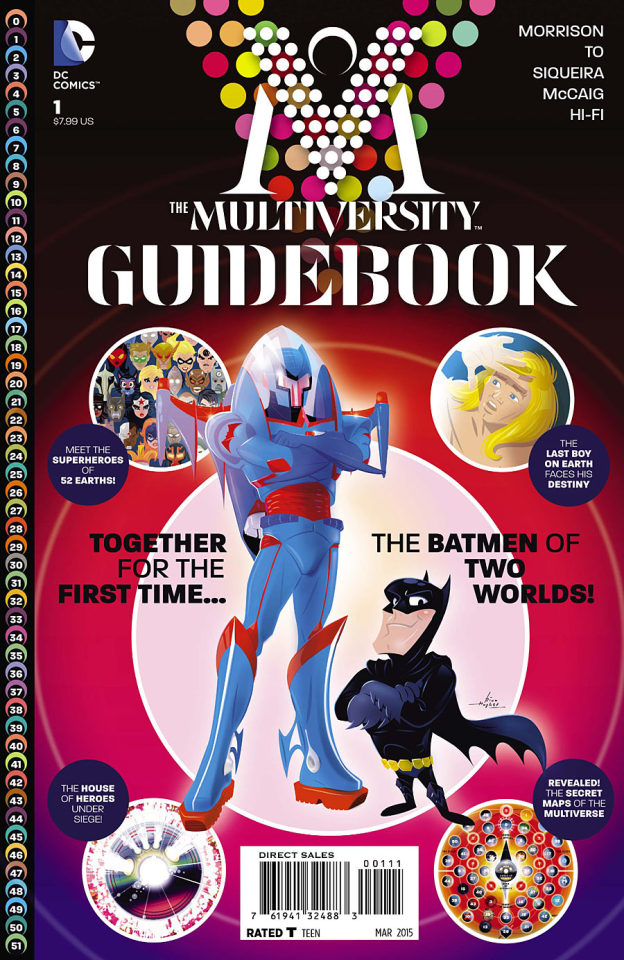
Moving into the Guidebook’s extended homageto “The Flash of Two Worlds!” - one with a distinctly 60s feel, between all theKirby getting thrown around and the build-up of DC mythology - we get to seewhat comic book time actually looks like from the outside (via the perspectiveKamandi, from a world where time has truly passed to the tune of anapocalypse), with Fox and Infantino’s simple tale of a costumed crimefightermeeting his own childhood storybook hero metastasizing into a time-shatteringhistory of reboots and retcons and parallel worlds, and two wildly differentproducts of that process coming face-to-face. After Thunderworld andthe finale it’s the most openly optimistic of the bunch, with the irrepressiblejoy Morrison clearly takes in all the nerd arcana and Lightray’s assertion thatlight will conquer darkness in the end, but it also ends with a Justice League,reduced conceptually to animatronic cartoons of themselves, dying andresurrecting in one manufactured Crisis after another for all eternity.
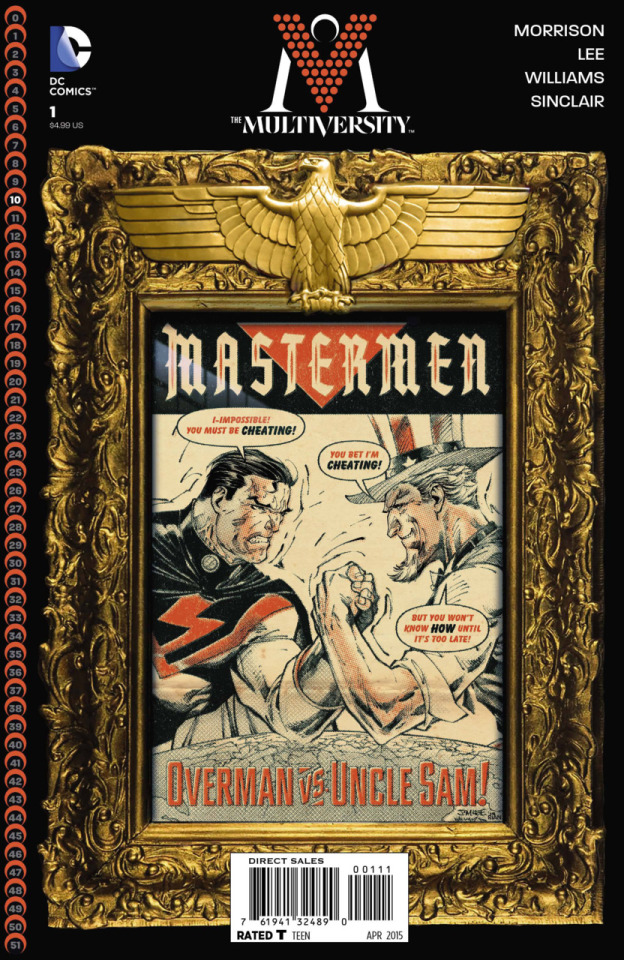
Hitting Mastermen, this is probably the mostdiscounted of the bunch, especially given it reads the most like it’sunfinished. However, I’d say it’s a pretty complete tragedy (especially thanksto @globegander‘s essayon it as a spiritual adaptation of Der Ring des Nibelungen),and much like with The Just - the other least-loved of theseries - the trappings on display are largely a way of facilitating what it’s talkingabout. It’s the story of a nation in power of men with pipes looking overnuclear families with dogs, where rich white boys complain that they shouldn’tbe held responsible for the actions of their ancestors, newscasters refer togenocides perpetrated by their nation within the last century as “theethnic and ideological purges of the Hitler era”, and theretaliation against them by terrorist insurgents is from a nation they broughttheir war to. It’s very much a story of America (2000s America specifically, inline with the decade parallels in play), and while Overman still wants to makeeverything right because he’s Superman, unlike its counterpart in Superman:Red Son which shows him managing to redeem himself from similarcircumstances to some extent, Mastermen makes no bones aboutthe fact that he is damned, utterly and irrevocably, just as aconsequence of being born into this society. Time here has destroyed thesuperhero by way of conformity, with well-meaning champions of truth, justice,and the Nazi way as barely-witting defenders of a corrupted status quo,unquestionably incapable of transcending what they’ve become. Hence whySuperman already exists as a comic when Hitler learns of Kal-L, the symbolismof two Jewish kids in the depression co-opted by the powers-that-be as thefascistic representative of amoral nationalistic interests, corrupting whatSuperman is supposed to stand for until even his attempts at rectifying thingscan only compound the problem. In essence, it’s the darkest possiblecontinuation of The Curse of Superman from Morrison and GeneHa’s Action Comics #9 - and it comes to the same conclusion ofwhat it takes to fight back in the finale later on.
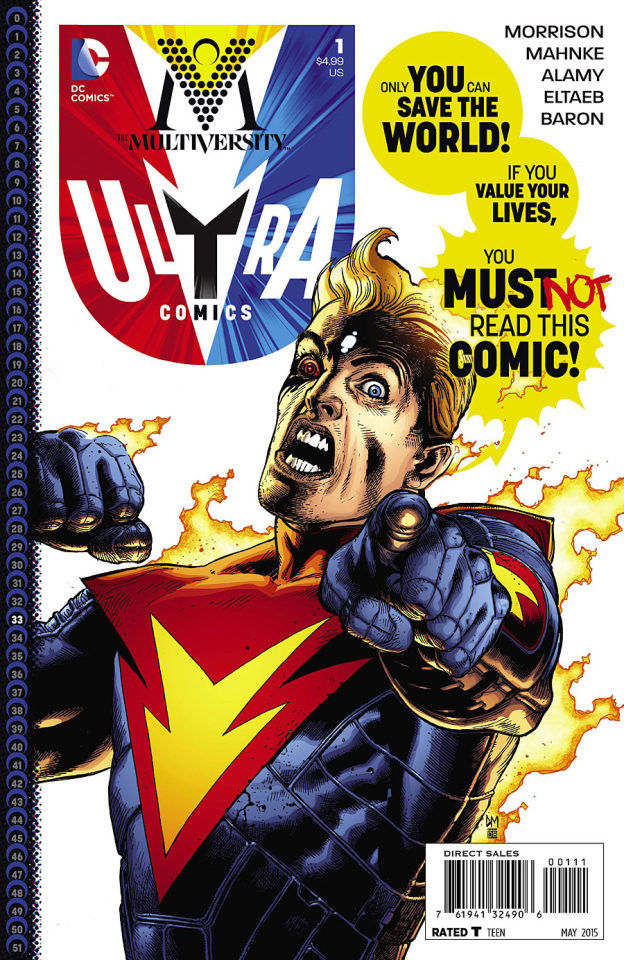
Ultra Comics - both the comic and the character,insomuch as there’s any meaningful division between the two - is the anti-FlexMentallo, down to the point of mimicking its four-act structure of thehistory of the superhero via montage, only replacing a ‘Renaissance’ asMorrison put it following comics ‘Dark Age’ with further brutality andadolescent defensiveness. It’s the horrors of every other chapter rolled intoone: Ultra’s an innocent superhero from circumstances that become moreunsettling the more you think about them, pre-packaged with his own ridiculousbackstory and history, who goes on an adventure forcing him to realize themorality his world is built on is impossible and defined by society rather thanan objective moral code, and he’s trapped forever in the violent structure ofhis story, consigned to repeat his life forever until it loses all meaning. Itis, as Charlotte Finn put it in her analysis, a killer bullet to the idea ofthe superheroes, hence why it’s a horrific cursed contaminant across themultiverse: in our world it’s just a depressing comic, but to a superhero it’sirrefutable evidence that their entire existence is meaningless, time almostliterally corroding him throughout the issue as he moves from optimisticsuperhero to cynical super-agent to old and realizing it was all for nothing todead. Even our own world is threatened after all, with the suggestion that allthe uplifting Flex Mentallo meta-stories and 70s Starlin-stylecosmic headtrip consciousness expansion comics that Morrison’s made so much ofhis own bread and butter on are as compromised as the rest of the genre.Incapable of saving us in the face of a larger culture preaching the embrace ofnihilism and a doomed tomorrow when the only thing a terrifying number ofreaders have gained from the message is a desire to complain about writers “rapingmy wallet” - and that without that ability to inspire, all comics, all fictionitself can do, is steal our time and rush us all the faster into thegrave courtesy of the Oblivion Machine.
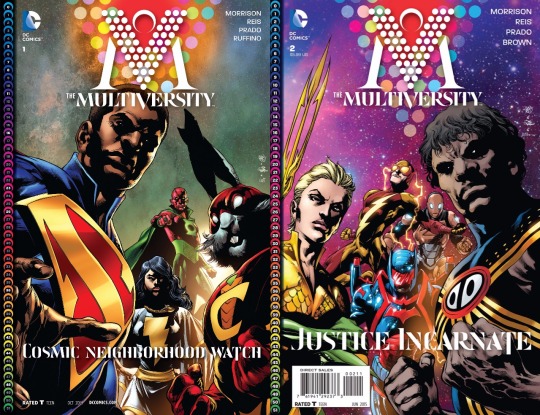
With the bookends, there’s fairly little to say I didn’t inthe original article I linked to above - i.e. that it flips the premise of timeinto a positive, showing that rather than using it to spin the wheels of thesuperhero genre in perpetuity until it devours itself through exhaustion orcontact with elements it can’t bear, or framing it as something to bedisregarded in spite of the consequences, it can be used to push things forwardinto more diverse and fruitful territory (hence not only the premise of theseries, but Multiversity sounding similar to Diversity), coming up with new andbetter stories. Much as Morrison is historically onboard with pulp heroes andlegacy heroes indicative of expansive superhero universes and structurallycomplex comics and retro comics and American superheroes and meta superheroes,there’s a difference between coming up with new stories in those contexts, andrerunning the old ones over and over again, which is probably why each of thosecomics, like I said matches up with a previous decade and comic, including someof his own, finally spinning here into the 2010s and DC’s own Crisis cycle.
While the first half of the bookend is in Morrison’s ownwords him doing himself to the point of parody - the self-insert character, theMonitor mythology, the weird villains yelling about conformity, thecomics-talking-about-comics, running into alternate company equivalents as apossible commentary on the state of the industry, etc. - the second isexplicitly the analogue to Morrison using his ‘corruption’ of contact with thedarkness and perpetuation of the neverending story for a paycheck to introducethe forces of the absurd, impossible and unexpected, i.e. the New, to defeat ahomogenizing, corruptive force designed to make everything the same and bleakto the point of literally forcing the Multiverse to relive the same Crisis overand over again, i.e. More Of The Same. It’s a slight twist on his typical Youngvs. Old/Children vs. Parents concerns (as best exemplified in his DC work in Seven Soldiers of Victory), but in theend, all of this is Morrison talking about something very, very simple: thatsuperheroes can absolutely be broken, but there’s a chance to save them andmake them something good and true again that might be able to reach us,literally by the end of the book, and it’s not by rerunning the same oldstories into the ground and unthinking conformity, but through doing new anddiverse and exciting things with them to inspire us in new ways. It’s Action Comics #9 as a 400-page epic.
I’m pretty sure that’s what Multiversity is about.
63 notes
·
View notes